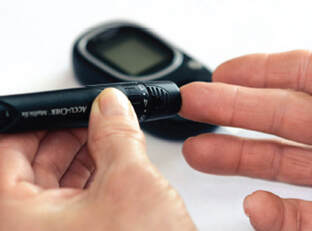LET’S TALK ABOUT HEALTH
Diabetes is a disease in which blood glucose (a simple sugar) values are abnormally high, because the body does not release insulin or uses it improperly. This disease affects all types of people anywhere in the world.
But what is insulin? Insulin is a hormone that the body needs to transform food into energy. This is very important because our body needs energy to function properly, and because it is made up of several organs that do different things. One of them is the pancreas where our body creates insulin. The function of the pancreas and the secretion of insulin is vital for there must be a control of sugar level in our blood. This is a chemical form of natural regulation that our own body creates between what the person consumes and their energy requirements sufficient to sustain the correct functioning of each cell, according to your demand, in the work you do. There are two types of diabetes: Type 1: insulin dependent. Type 2: non-insulin dependent. Diabetes affects various systems and organs when it occurs. Blood vessels, eyes, kidney, nerves, skin, and blood. Every year 1.5 million Americans are diagnosed with diabetes as new cases. SYMPTOMS: Polyuria: urinating a lot, many times Thirst Exaggerated apetite Blurry visión Excesive sleepiness or tiredness Nausea Wounds that do not heal PREVENTION Healthy and balanced diet: a healthy diet, low in calories, sodium and sugars will help you maintain a stable weight and reduce your body fat levels. Constant physical activity: diabetes is more common in sedentary people. Sport helps lower blood sugar levels and lower body fat. Adequate weight: it is estimated that 80% of people with diabetes are overweight, it is essential to keep a constant control to avoid weight increase. Family background: those who have relatives with diabetes are at higher risk of suffering from this disease. Risk diseases: it is common for other diseases such as hypertension to be associated with diabetes. To detect them in time, a regular check-up is ideal for keeping a comprehensive control of our health. DEBUNKING MYTHS: There are many myths about diabetes that make it harder for people to take facts seriously. These myths can create an incorrect image of diabetes, full of stereotypes and negativism. Here are three of them: Myth 1: Diabetes is not a serious disease. Fact: Diabetes causes more deaths each year than breast cancer and AIDS combined. In the US, 2 out of 3 people with diabetes die from an associated complications , such as heart disease or stroke. Myth 2: Obese or overweight people will get Type 2 diabetes. Fact: Being overweight is a risk factor for this disease, but other risk factors also play a role, such as family history, race, and age. Many people ignore other risk factors and think that weight is the only risk factor for Type 2 diabetes. Many people who are overweight do not have Type 2 diabetes and many people with Type 2 diabetes are of normal weight or very slightly overweight. Myth 3: Eating too much candy causes diabetes. Fact: The cause of Type 1 diabetes is genetic and unknown factors that trigger the onset of the disease; the cause of Type 2 diabetes are genetic and lifestyle factors. Being overweight increases the risk of diabetes: studies show that drinking sugary drinks is associated with Type 2 diabetes. The American Diabetes Association recommends that people limit their consumption of sugary drinks to help prevent diabetes. The most common are:
Sources: www.diabetes.org American Diabetes Association Merck Home Health Information Manual Book |

